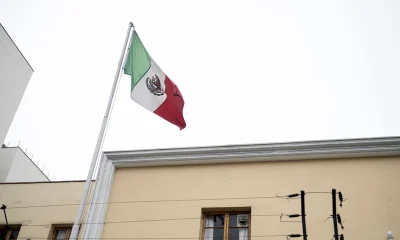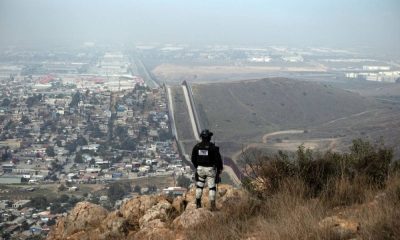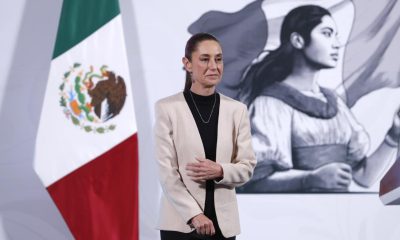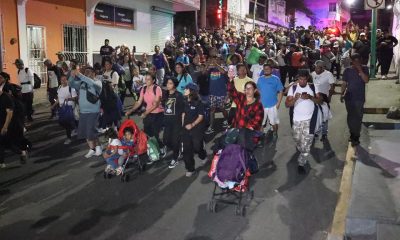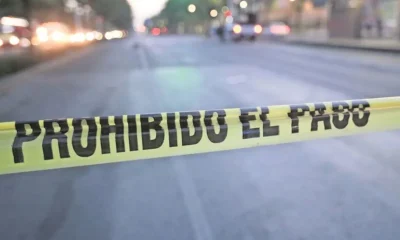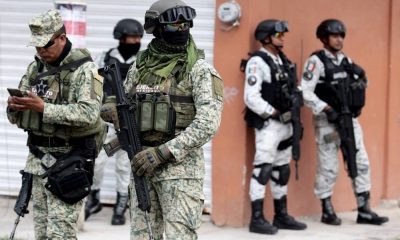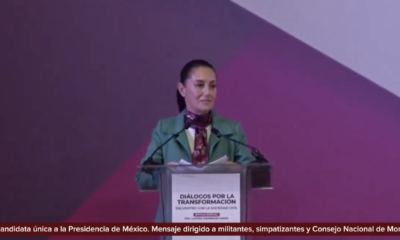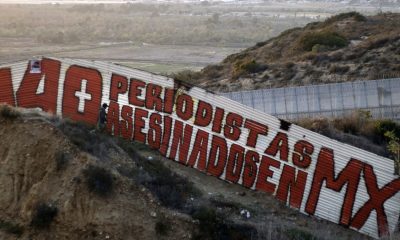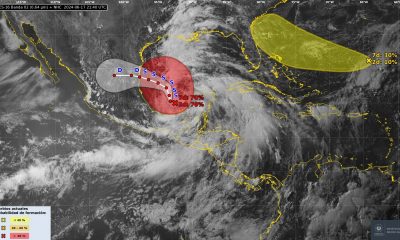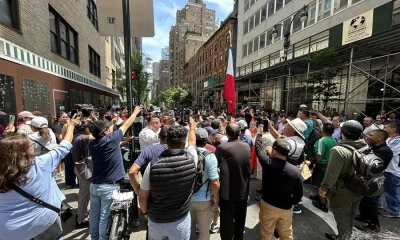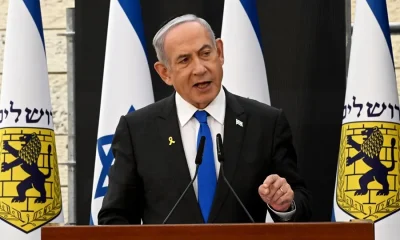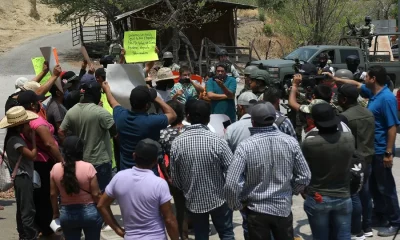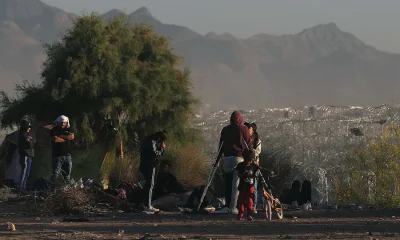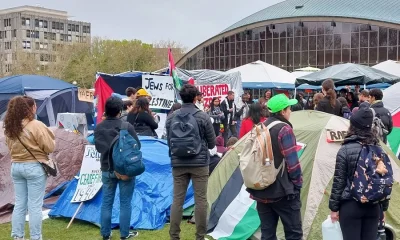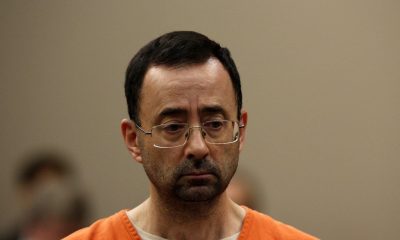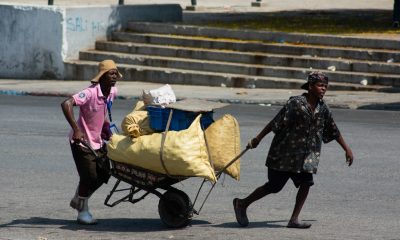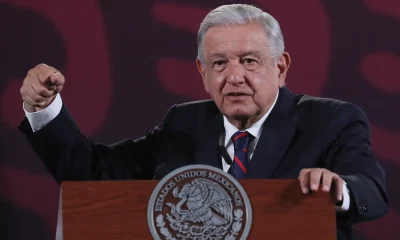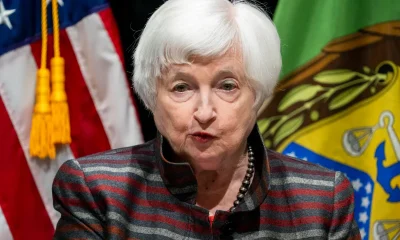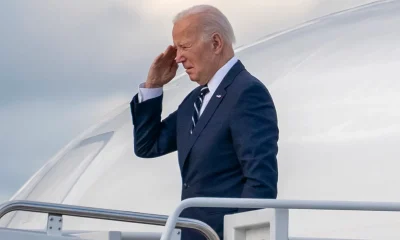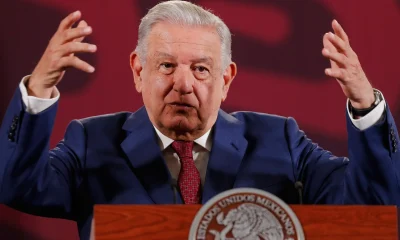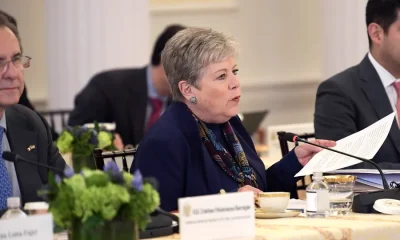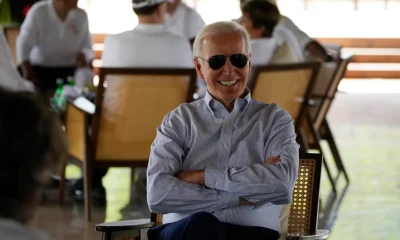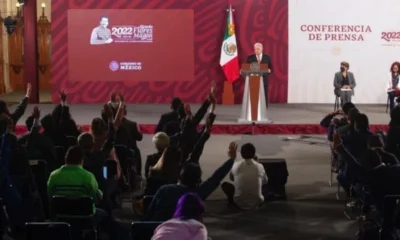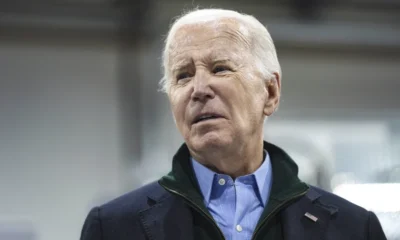International
López Obrador recognizes drug production in Mexico and blames the United States for the consumption
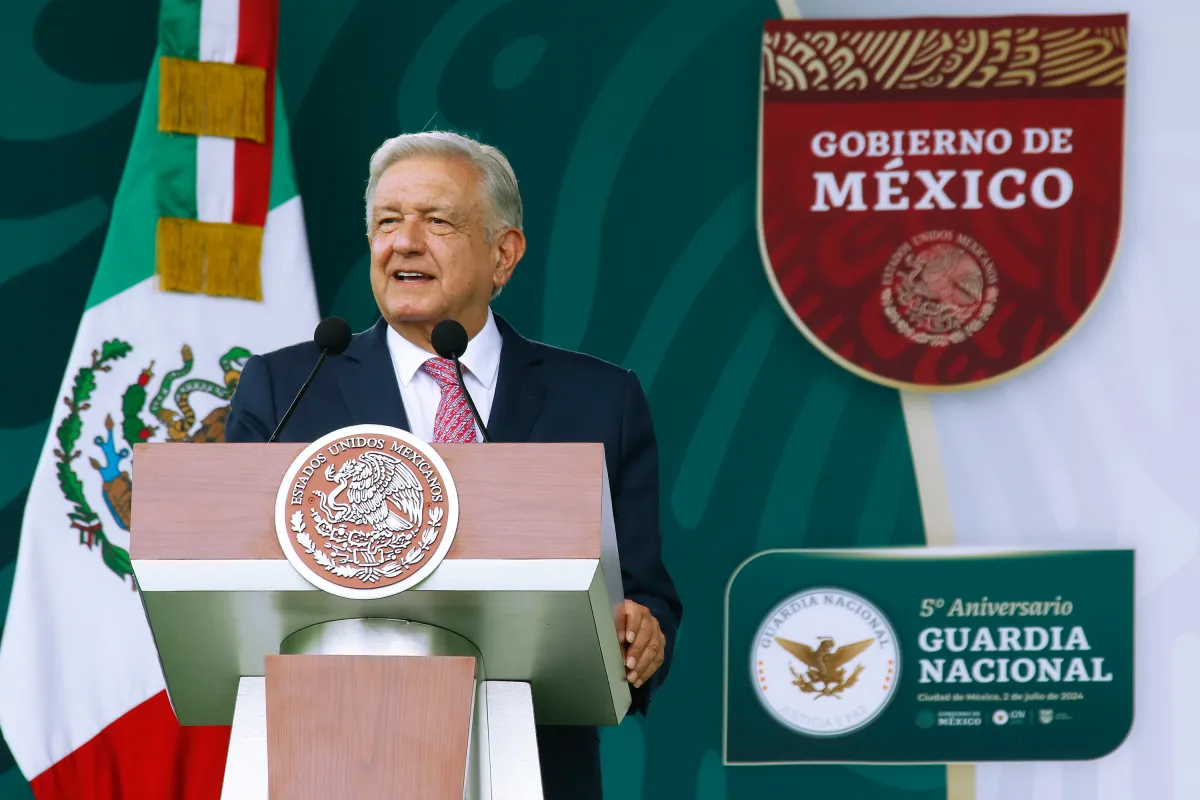
The president of Mexico, Andrés Manuel López Obrador, acknowledged on Tuesday that there are “crime groups” that produce drugs in the country, although he blamed the United States because its consumption is “increasingly” higher.
“The causes have to be addressed (in the United States) and this will also help us a lot because here there are crime groups that are dedicated to the production of drugs,” he said in the celebration of the fifth anniversary of the National Guard (GN), a body that he conceived in 2019.
However, he warned that “as long as there is consumption as happens, and more and more, in the United States, more problems” occur in Mexico to “confront organized crime” that traffics in drugs.
This is one of the first times that the president, who will replace the presidency of Claudia Sheinbaum on October 1, recognizes the production of narcotics by Mexican cartels.
In fact, at the end of March he stated that there is “very little fentanyl” made in Mexico, after he denied for years the information of the United States Anti-Drug Agency (DEA), which maintains that this narcotic is produced in the country with chemical precursors from Asia.
“We must convince, because we are brothers and good neighbors, Americans so that they address the causes that cause the high consumption of drugs they have,” he recommended to the agents of the GN and a good part of his presidential Cabinet.
He stressed that this situation leads to “very unfortunate” circumstances in the United States, such as the death of young people from overdose, especially due to the consumption of the “terrible drug of fentanyl.”
“What we have to try is that young people do not come out of the families so young, that this custom is revised,” López Obrador suggested.
So he was committed to “helping in any way possible” from Mexico.
On the other hand, the current president described how his administration is “confronting the scourge of violence” with measures such as the daily celebration of the Security Cabinet or the creation of the GN, which López Obrador wants to integrate into the Secretariat of National Defense (Sedena).
One of its controversial constitutional reforms announced in February was already attempted in September 2022 with a legal change to include the GN in the Sedena and that, subsequently, was invalidated by the Supreme Court of Justice of the Nation (SCJN).
During the creation of the Guard, it was established that the body of 130,000 agents should be in charge of the Secretariat of Security and Citizen Protection (SSPC).
“It is progressing, not as we would like, but we must take into account that it is a very aggravated evil because they left it for a long time without attention,” he acknowledged.
He opined that, since his entry into the National Palace, the causes that originate violence are being “advered” through different policies, such as “guaranteeing” universal access to health and “that there is social security.”
Also, López Obrador demanded to “take care” that drug use does not grow within Mexico, now “very focused” in some areas, and appealed to the original cultures, the “protective shield” of society, to carry it out.
“Mexicans, I say this with all respect, are not vicious or prone to drugs,” he said.
International
U.S. Senate Rejects Budget, Bringing Government Closer to Shutdown Amid DHS Dispute

The U.S. Senate voted on Thursday against a budget proposal in a move aimed at pressuring changes at the Department of Homeland Security (DHS), following the killing of two civilians during a deployment of immigration agents in Minneapolis.
All Senate Democrats and seven Republican lawmakers voted against the bill, which requires 60 votes to advance, pushing the country closer to a partial government shutdown that would cut funding for several agencies, including the Pentagon and the Department of Health.
The rejection came as Senate leaders and the White House continue negotiations on a separate funding package for DHS that would allow reforms to the agency. Proposed measures include banning Immigration and Customs Enforcement (ICE) agents from wearing face coverings and requiring them to use body-worn cameras during operations.
The vote took place just hours after President Donald Trump said he was “close” to reaching an agreement with Democrats and did not believe the federal government would face another shutdown, following last year’s record stoppage.
“I don’t think the Democrats want a shutdown either, so we’ll work in a bipartisan way to avoid it. Hopefully, there will be no government shutdown. We’re working on that right now,” Trump said during a Cabinet meeting at the White House.
International
Trump Says Putin Agreed to One-Week Halt in Attacks on Ukraine Amid Extreme Cold

U.S. President Donald Trump said on Thursday that he secured a commitment from Russian President Vladimir Putinto halt attacks against Ukraine for one week, citing extreme weather conditions affecting the region.
“Because of the extreme cold (…) I personally asked Putin not to attack Kyiv or other cities and towns for a week. And he agreed. He was very pleasant,” Trump said during a Cabinet meeting broadcast by the White House.
Trump acknowledged that several advisers had questioned the decision to make the call.
“A lot of people told me not to waste the call because they wouldn’t agree. And he accepted. And we’re very happy they did, because they don’t need missiles hitting their towns and cities,” the president said.
According to Trump, Ukrainian authorities reacted with surprise to the announcement but welcomed the possibility of a temporary ceasefire.
“It’s extraordinarily cold, record cold (…) They say they’ve never experienced cold like this,” he added.
Ukrainian President Volodymyr Zelensky later commented on the announcement, expressing hope that the agreement would be honored.
International
Storm Kristin Kills Five in Portugal, Leaves Nearly 500,000 Without Power

Storm Kristin, which battered Portugal with heavy rain and strong winds early Wednesday, has left at least five people dead, while nearly half a million residents remained without electricity as of Thursday, according to updated figures from authorities.
The revised death toll was confirmed to AFP by a spokesperson for the National Emergency and Civil Protection Authority (ANPEC). On Wednesday, the agency had reported four fatalities.
Meanwhile, E-Redes, the country’s electricity distribution network operator, said that around 450,000 customers were still without power, particularly in central Portugal.
Emergency services responded to approximately 1,500 incidents between midnight and 8:00 a.m. local time on Wednesday, as the storm caused widespread disruptions.
The Portuguese government described Kristin as an “extreme weather event” that inflicted significant damage across several regions of the country. At the height of the storm, as many as 850,000 households and institutions lost electricity during the early hours of Wednesday.
Several municipalities ordered the closure of schools, many of which remained shut on Thursday due to ongoing adverse conditions.
Ricardo Costa, regional deputy commander of the Leiria Fire Brigade, said residents continue to seek assistance as rainfall persists.
“Even though the rain is not extremely intense, it is causing extensive damage to homes,” he noted.
In Figueira da Foz, a coastal city in central Portugal, strong winds toppled a giant Ferris wheel, underscoring the severity of the storm.
-

 Central America4 days ago
Central America4 days agoGuatemala seizes over a ton of cocaine hidden in flour at Pacific port
-

 International5 days ago
International5 days agoDelcy Rodríguez seeks political agreements after Maduro’s ouster
-

 International4 days ago
International4 days agoHistoric snowstorm paralyzes Toronto after 60 centimeters of snow
-

 Central America2 days ago
Central America2 days agoGuatemala Police Arrest Prison Guard Caught in the Act of Extortion
-

 Central America2 days ago
Central America2 days agoBukele leads public trust rankings as UCA survey highlights gains in security
-

 Central America2 days ago
Central America2 days agoHonduras swears in conservative president Asfura after disputed election
-

 International4 days ago
International4 days agoSpain’s irregular migrant population rises to 840,000, study finds
-

 International5 days ago
International5 days agoFederal immigration agents kill man in Minneapolis, sparking protests and outrage
-

 International1 day ago
International1 day agoFootball Fan Killed in Clashes After Colombian League Match
-

 International2 days ago
International2 days agoWinter Storm Fern Leaves 30 Dead and Over One Million Without Power Across the U.S.
-

 Central America1 day ago
Central America1 day agoGuatemala President Says Starlink Terminal Found Inside Prison
-

 Sin categoría2 days ago
Sin categoría2 days agoEight Killed in Series of Armed Attacks in Ecuador’s Manabí Province
-

 International2 days ago
International2 days agoDoomsday clock moves to 85 seconds before midnight amid rising global risks
-

 International4 days ago
International4 days agoRights group says nearly 6,000 killed in Iran protest crackdown
-

 International1 day ago
International1 day agoMissing Spanish Sailor Rescued After 11 Days Adrift in Mediterranean
-

 International1 day ago
International1 day agoRubio Says U.S. Could Participate in Follow-Up Russia-Ukraine Talks
-

 International2 days ago
International2 days agoSpain approves plan to regularize up to 500,000 migrants in Historic Shift
-

 Sin categoría2 days ago
Sin categoría2 days agoEl Salvador Launches Fourth Year of Ocean Mission to Protect Marine Ecosystems
-

 International4 days ago
International4 days agoVenezuela frees at least 80 political prisoners, NGO says
-

 International4 days ago
International4 days agoEU launches new probe into X over AI-generated fake nude images
-

 International9 hours ago
International9 hours agoU.S. Senate Rejects Budget, Bringing Government Closer to Shutdown Amid DHS Dispute
-

 International4 days ago
International4 days agoFrance debates ban on social media for children under 15
-

 International4 days ago
International4 days agoSevere winter storm grips U.S., leaves multiple dead as extreme cold persists
-

 International9 hours ago
International9 hours agoStorm Kristin Kills Five in Portugal, Leaves Nearly 500,000 Without Power
-

 International9 hours ago
International9 hours agoTrump Says Putin Agreed to One-Week Halt in Attacks on Ukraine Amid Extreme Cold
-

 International9 hours ago
International9 hours agoMan Arrested After Vehicle Crashes Into Jewish Institution in Brooklyn

























